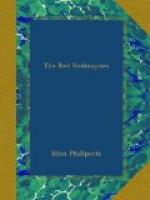He soon departed and the Redmayne inquiry, begun with much zest and determination, gradually faded away and perished of inanition. No solitary clue or indication of progress rewarded the investigations. Robert Redmayne had vanished off the face of the earth and his brother with him. There remained of the family only Albert and his niece—a fact she imparted, not without melancholy, to Mark Brendon, when the day came that he must take his leave of her and return to other and more profitable fields of work.
He urged her to join her uncle as soon as possible and he begged her to accept his willing service in any way within his power; while she was gracious and thanked him for all that he had done.
“I shall never, never forget your patience and your great goodness,” she said. “I am indeed grateful, Mr. Brendon, and I hope, if only for your sake, that time will lay bare the truth of these horrible things. To know that good men, against whom there was no grudge or hate in the world, have been murdered by their fellow men—it is a nightmare. But God will bring the truth to light—I feel positive of that.”
He left her more deeply in love than ever; but there seemed no note of hope or promise in their farewell. And yet he felt a profound conviction that they would meet again. She undertook to acquaint him with her movements and was not sure that she would accept Albert Redmayne’s invitation to join him. So Mark left her, believing that Doria was certain to determine her future and guessing that, if she presently proceeded to Como, the lively and indomitable Italian would quickly follow.
For the present, however, Giuseppe seemed to be concerned with his own affairs. He brought Brendon back on his last journey from “Crow’s Nest” in the launch and explained that he had already found good work beside the Thames.
“We shall, I hope, meet again,” he said, “and you may hear presently of a very wonderful adventure in which Doria shall be l’allegro—the merry man and the hero!”
They talked and Mark became impatient under a growing consciousness that the quicker-witted spirit was pulling his leg. Doria preserved the best possible temper, but his Latin love of a certain sort of fun seemed cynical and almost inhuman under the circumstances.
They spoke of the mystery and, upon that subject, the motor boatman declared himself as quite unable to find any explanation; but, with respect to Brendon’s failure, he did not hesitate to make a sly allusion. Indeed he hinted at things which Mark was to hear six months later in a more responsible mouth.
“Above all, what has puzzled me most in this horrid affair is you, Brendon,” declared Giuseppe. “You are a great sleuth, we know; yet you are no better than the rest of us stupid people before these happenings and horrors. That made me wonder for a long time; but now I wonder no longer.”
“I’m beat and I own it. I’ve missed something vital—the keystone of the arch. But why do you say that you wonder no more? Because you know me now and find me a very dull dog?”




